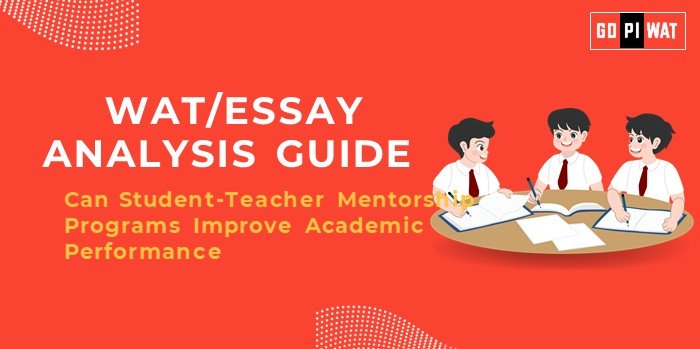📋 WAT Analysis Guide: Can Student-Teacher Mentorship Programs Improve Academic Performance?
🌟 Understanding the Topic’s Importance
Student-teacher mentorship programs have a profound impact on academic performance and personal development, making it a vital discussion point for education-focused B-school candidates.
📝 Effective Planning and Writing
Time Allocation:
- Reading & Planning: 5 minutes
- Writing: 20 minutes
- Review: 5 minutes
💡 Introduction Techniques for Essays
1. Contrast Approach: “Despite technological advancements in education, personal mentorship programs remain unparalleled in fostering academic excellence.”
2. Solution-Based Approach: “Student-teacher mentorship bridges the gap between traditional teaching and the need for personalized guidance in today’s education systems.”
📚 Structuring the Essay Body
- 🏆 Achievements:
- Use examples like reduced dropout rates and improved STEM performance.
- Highlight emotional resilience fostered by mentorship.
- ⚖️ Challenges with Comparative Analysis:
- Discuss constraints in resources and teacher availability.
- Compare the U.S. AVID model with less formalized systems in other countries.
- 🔮 Future Outlook:
- Recommend integration of technology (e-mentoring).
- Suggest scalable models for underserved areas.
🔗 Concluding Effectively
Balanced Perspective: “Mentorship programs drive academic improvement, but success depends on scalable, resource-efficient designs.”
Global Comparison: “Like Finland’s mentorship success, implementing structured programs globally can elevate educational outcomes.”
🌱 Recommendations for Sustainable Progress
- 📚 Introduce training modules for teacher-mentors.
- 💻 Use technology for scalable mentorship.
- 🏛️ Policy-driven funding and incentives for program adoption.
✍️ Sample Short Essays
1. Balanced Perspective:
“Student-teacher mentorship programs have transformed academic landscapes by addressing individual student needs. However, their success hinges on resource availability and teacher training.”
2. Solution-Oriented:
“Mentorship programs are a panacea for the challenges in modern education. By leveraging technology and training, these programs can scale to meet diverse student needs.”
3. Global Comparison:
“Educational systems worldwide are adopting mentorship programs with notable success, as seen in Finland. India’s potential lies in embracing such models for inclusive education.”


